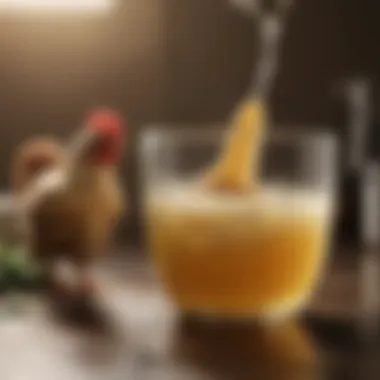Best Homemade Meals for Dogs with Diarrhea Relief


Intro
Dogs, like humans, can experience dietary discomforts resulting in diarrhea. This not only affects their well-being but can also be worrisome for pet owners. Recognizing the right dietary solutions for dogs with diarrhea is crucial for alleviating their condition. Home-cooked meals can provide effective aid in these situations, combining the convenience of cooking with nutritional benefits tailored specifically to your dog's needs. This covers multiple aspects, from understanding possible causes behind diarrhea to recommended meal options and careful nutritional balancing.
Understanding Diarrhea in Dogs
Diarrhea can stem from various factors: dietary changes, stress, or infections. Owners should first assess the situation clearly. Is the dog able to stay hydrated? Are there any other symptoms present that need medical attention? This initial observation alongside dietary management is essential in providing comfort.
Home-Cooked Meal Options
When cooking for a dog suffering from diarrhea, it is important to select ingredients known for their gentle impact on the digestive system.
Key Ingredients to Include
- Boiled Chicken: Chicken is easily digestible and rich in protein, which is beneficial for weakened dogs. Make sure it is skinless and boneless.
- White Rice: Commonly recommended for upset stomachs, white rice helps bind stool and offers a soft source of carbohydrates.
- Pumpkin: Pure pumpkin, especially canned, is high in fiber which can stabilize digestion; it can also help add moisture.
- Plain Yogurt: A small amount of plain yogurt can introduce beneficial probiotics, promoting recovery in digestion.
Example Recipe: Rice and Chicken Dish
To prepare a simple yet nutritious meal, consider the following dish:
Nutritional Balance
Ensuring nutritional balance is never overlooked. Even more when adjusting the diet due to a diagnosis such as diarrhea. While the meals cater to recovery, portions should maintain some variety as well. Effective combinations could include balancing proteins with carbohydrates and adding necessary fats in moderation.
Understanding Canine Diarrhea
Recognizing the facets of canine diarrhea is essential for any dog owner but specially crucial when you notice irregular digestive behavior in your pet. Diarrhea can lead to dehydration and elicit preventable complications. Understanding its implications can not only offer immediate solutions but set a groundwork for long-term pet health management. Often, a focused approach can mitigate serious risks. Dogs might present with varying symptoms—everything from mild upset to severe dehydration, depending on the underlying condition. Thus, acknowledging the symptoms early contributes directly to faster recovery.
Definition and Symptoms
Canine diarrhea is essentially defined as an increased frequency of loose or watery stools in dogs. It can be acute, lasting a few days, or chronic, extending over weeks. Recognizable symptoms often accompany this condition. Common signs include frequent bathroom visits, fecal incontinence, and signs of discomfort such as whining or straining. Beyond these, other symptoms may arise, including lethargy, vomiting, and a loss of appetite. It's vital to observe your pet closely during this period; early identification of the condition streamlines subsequent treatment.
Common Causes
The reasons for diarrhea in dogs are multifaceted and can range from mild dietary changes to serious health issues. Familiar culprits include:
- Dietary indiscretion: Consumption of table scraps, spoiled food, or non-food items can throw off digestive stability.
- Bacterial infections: Both viral and bacterial pathogens can disrupt normal digestion.
- Kill-allergies: Some dogs may be intolerant to specific ingredients in their diet.
- Parasites: Issues like worms can lead to gastrointestinal disturbances.
Each of these factors can influence the dog’s overall health and performance. Gaining insight into these causes is vital to navigate dietary decisions effectively.
When to Consult a Veterinarian
In the event of diarrhea, there are crucial moments where seeking veterinary advice is imperative. You should consult a vet when symptoms persist more than 24-48 hours. Observing additional symptoms, like vomiting, high fever, or blood in the stool, elevates this urgency. Puppies and older dogs are at greater risk during such episodes; timely intervention matters significantly in either group. When your dog's behavior shifts drastically or if dehydration becomes apparent, professional help is necessary. It never hurts to be cautious.
It's worth remembering that untreated diarrhea can lead to more severe consequences, like dehydration, which impairs health systems.
Nutritional Needs During Diarrhea
Understanding what a dog needs nutritionally during episodes of diarrhea is essential for their recovery. A specialized diet can facilitate healing and restore balance to the digestive system. During diarrhea, the dog’s gastrointestinal tract needs gentle foods that are easy to digest while ensuring the intake of necessary nutrients and fluids. Ensuring that pet owners are aware of the right nutritional components can notably improve the wellbeing and comforts of their pets.
Importance of Hydration
Hydration is vital when a dog suffers from diarrhea. Diarrhea can cause significant fluid loss, which often leads to dehydration if not properly managed. Since dogs generally have a higher water percentage in their bodies, it makes them prone to losing critical fluid quickly.
- Signs of Dehydration: Monitor for symptoms like dry gums, lethargy, increased heart rate, or reduced skin elasticity. If any of these arise, it's important to seek veterinary assistance promptly.
- Encouraging Fluid Intake: Providing fresh, clean water is essential. In some cases, offering an electrolyte solution designed for canines can aid in rehydration more effectively.
- Food to Help Hydration: Certain foods, such as bone broth or hydrating fruits, can also boost fluid levels while being gentle on the gut.
Constant access to water and rehydrating foods should be prioritized during this time to prevent more serious health problems.
Key Nutrients for Recovery
Recovery from diarrhea isn’t just about hydration; it also requires specific nutrients that help the digestive system heal appropriately. A focus on digestibility and bioavailability is the foundation for creating dietary suggestions that facilitate recovery. Including the right macro and micronutrients will support meatablolism and overall health.


- Proteins: Limiting the source of protein to lean options like chicken or turkey can support healing without putting additional strain on the digestive system. Proteins are essential for repairing gut lining and supporting immune function.
- Carbohydrates: Easily digestible carbohydrates, like white rice or sweet potatoes, provide energy without burdening the gut. These carbohydrates help to firm up stool consistency as they can absorb excess water.
- Vitamins and Minerals: Including supplements or adding veggies like boiled carrots can ensure the intake of vitamins that may increase during stress. However, these should be offered in moderation to avoid overwhelming your dog's system.
Important Notes: Consultation with a veterinarian before making significant dietary changes ensures tailored advice suitable for the dog's specific health status. Professionals may offer dietary plans that enhance recovery while also addressing the underlying causes of diarrhea.
Proper nutrition during this convalescence period plays a decisive role in overall recovery and helps sustain a strong immune system, setting a path toward regained health and normalcy.
Recommended Ingredients for Home-Cooked Meals
When a dog is suffering from diarrhea, it is vital to provide meals that are gentle on their digestive system. The ingredients put to use in home-cooked meals can significantly impact your dog's recovery. Picking appropriate components mitigates the stress on the stomach while providing essential nutrients. Lean proteins, digestible carbohydrates, and select vegetables should be the foundation of any canine diet aimed at recovery.
Lean Proteins
Proteins are crucial for your dog's well-being and recovery process. During diarrhea, dogs require easy-to-discover protein sources that their bodies can absorb effectively. Opt for lean meats such as chicken or turkey. These cuts help maintain muscle mass without overburdening the digestive tract. Furthermore, cooking these proteins plain is important. Avoid spices and any fatty marinades that could exacerbate the problem.
One beneficial source is boiled, skinless chicken breast. This option is not just palatable but also very easy to digest. Alternatively, you might use turkey, as it presents similar characteristics regarding digestibility and nutrient content. Fish can also be an option but should still be straightforward and devoid of any flavors that could distress the stomach.
Digestible Carbohydrates
Dog's digestion may falter during periods of diarrhea. Therefore, the introduction of carbohydrates needs careful consideration. You may opt for white rice or oats as viable sources. These carbohydrates absorb excess moisture and provide a calming effect on the stomach. Both rice and oats contribute to digestive balance and offer a temporary source of energy.
It is essential to cook these carbohydrates fully before feeding them to your dog. Undercooked grains might cause additional discomfort and irritation. Moreover, brown rice is generally healthier but can be tougher for a dog suffering from diarrhea. Start with simpler forms before advancing to anything complex.
Vegetables to Include
While not the main components of a dog's meal during such times, certain vegetables can offer benefits without putting too much strain on the intestine. Carrots and pumpkin are notable examples. They dodge many common irritants while supplying valuable nutrients and fiber, supporting recovery without complicating symptoms.
Boiled or steamed, carrots should be broken into small pieces, making them more palatable and easier to consume. The presence of pumpkin, particularly canned and Babylon, is known for enhancing digestion due to its fiber content. In amounts appropriate to the diet, vegetables essentially replenish lost nutrients during fecal compromise.
Eating bland, easy-to-digest foods is essential for your dog's recovery.
Simple Recipes for Dogs with Diarrhea
Simple recipes for dogs with diarrhea are key for ensuring your pet receives nourishing, easily digestible food during a sensitive time. The focus here is on providing options that soothe the digestive system while maintaining nutritional balance. These recipes feature familiar, single-source ingredients that tend to be gentler on the stomach, offering a thoughtful remedy to intestinal distress.
Chicken and Rice
Preparation Steps
The preparation steps for chicken and rice are straightforward and cater to the need for simplicity when cooking for a dog experiencing diarrhea. Boiling lean chicken breast and pairing it with white rice creates a bland diet that is gentle for digestion. The primary characteristic of this recipe is its easy-to-follow method, making it accessible for all pet owners, regardless of their cooking experience.
A unique feature of this preparation is that it involves no spices or added ingredients. This minimizes the risk of aggravating your dog's digestive system. The advantage of this recipe lies in its balance; chicken provides protein, while rice serves as a binding agent, helping to solidify stool.
Serving Suggestions
Regarding serving suggestions for chicken and rice, the focus is on providing the right portion sizes for your dog’s specific needs. For instance, small dogs will require less food than larger breeds. It is advised to start with small servings, allowing the dog to adapt to the new diet easily. In this matter, a beneficial aspect is to observe any changes in your dog’s stool shortly after serving.
Familiarizing your pet with the newly made diet can be a gradual approach. You may add a splash of low-sodium chicken broth to enhance taste without the risk of upsetting its digestive system. The flexibility in serving helps meet various appetites among different dogs, making it a popular choice during such moments of concern.
Pumpkin and Turkey Mix
Preparation Steps
Preparing the pumpkin and turkey mix is relatively simple and offers another nutritious alternative. Ground turkey is an excellent protein source that can be easily mixed with cooked pumpkin. The combination here is fundamentally designed for optimal digestion. The key characteristic is its inclusion of high-fiber pumpkin, which can help firm up loose stools.
The advantage lies in the simplicity of making the dish in larger batches. You can freeze portions for later use, ensuring that a healthy option is always on hand. Ingredients can easily be blended in one pot, providing a special feature that makes cleanup easy.
Serving Suggestions
When considering serving suggestions for pumpkin and turkey mix, you arrange it similarly to chicken and rice, aiming for appropriate portion sizes based on your dog’s weight. Also, it is smart to gradually increase the amount served to monitor bowel movement responses. A unique aspect here is that the appealing orange color may be more enticing to some dogs, encouraging them to eat when other diets may fall flat.
You can mix in a small amount of low-fat cottage cheese for added protein once your dog starts to recover, which can also serve as something new during recovery, although a dog’s reaction needs monitoring.
Sweet Potato and Chicken Stew


Preparation Steps
The preparation steps for sweet potato and chicken stew bring comfort to healing. This recipe involves diced chicken slowly cooked with sweet potatoes. The appealing part is the gradual simmering. Stewing allows flavors to meld while keeping the chicken tender. Moreover, sweet potatoes are packed with nutrients and easy to digest. A beneficial feature of both ingredients is their natural ability to provide energy without causing upset stomach.
You can prepare large portions and freeze excess, allowing you to have meals ready when your pet needs them. The downside could be the additional time it takes to prepare compared to simpler recipes; however, the gentle simmer often produces a meal that is exceptionally mild for delicate tummies.
Serving Suggestions
In terms of serving suggestions for the sweet potato and chicken stew, serving warm, rather than hot, promotes comfort for your dog. Eyeballing portions based on the dog’s size remains crucial. One noteworthy way to serve would be directly out of the bowl or in a raised dish; this adds an element of ease for the dog, giving it a chance to enjoy the meal more comfortably.
You may often choose to blend the stew for dogs that may stress over chewing in their distressed state, which gently adjusts food texture while still offering a wholesome meal alternative.
Simple recipes play an essential role in helping dogs recover from diarrhoea. Each recipe features easily digestible food prepared with care, promoting quick recovery without overwhelm.
Foods to Avoid
Avoiding certain foods is crucial when preparing meals for dogs experiencing diarrhea. Some ingredients can exacerbate their condition, leading to further digestive distress. Not all foods that we may perceive as suitable are actually good during this time of recovery. It's essential to be aware of these potential pitfalls in order to ensure a safe and effective dietary plan.
High-Fat Foods
High-fat foods can be very harmful for dogs with diarrhea. Their digestion can become more challenging when their system is already upset. Foods rich in fats may lead to increased inflammation in the gastrointestinal tract, making it even harder for recovery. Fatty cuts of meat and greasy snacks should be completely avoided in these situations. Dogs can experience more diarrhea or vomiting when overexposed to high-fat content during fragile periods.
Why to avoid:
- Digestive Stress: The more fat in the meal, the harder it is for the dog’s body to process.
- Potential Weight Issues: Even if the dog is not eating much, diet loaded with fats can lead to weight problems long-term.
Dairy Products
Dogs, like many mammals, do not necessarily digest dairy well, particularly during episodes of diarrhea. Lactose intolerance is relatively common. As such, introducing dairy could intensify discomfort rather than soothe. Milk, cheese, and other dairy products can lead to sluggish digestion or additional gastrointestinal issues.
Key points on dairy:
- Lactose Content: Many dogs fail to process lactose efficiently; this becomes critical when they already face digestive trouble.
- Goal-Focused Meals: It’s best to stick with meals that cater directly to the dog's immediate needs, avoiding unnecessary complications from dairy.
Certain Vegetables and Grains
Not all vegetables and grains qualify for doggy vacations from diarrhea. Some vegetables may trigger issues instead of ameliorating them. While healthy in other circumstances, items like onions and garlic can be incredibly harmful to dogs. Furthermore, certain grains may also promote gas and bloating, contributing to discomfort rather than alleviating it. Knowing which foods are beneficial versus harmful is pivotal for quick recovery.
Vegetables and grains to be cautious of:
- Onions and Garlic: Known to be toxic
- Certain legumes: Too much gas-producing capacity could exacerbate conditions
- whole grain products: Dogs may not digest certain fibers well at this time.
Maintaining a careful balance of ingredients is invaluable for a proper and timely recovery. Avoiding these foods allows for a gentler approach to feed a sensitive stomach and improves recovery chances, anchoring the foundation for a return to better health.
These guidelines on foods to avoid are a cornerstone in supporting your dog's recovery journey. In doing so, you support an effective digestive operation, steering clear of unnecessary complications and additional stress to their systems.
Monitoring Your Dog's Recovery
Monitoring your dog's recovery from diarrhea is crucial for their overall wellness. After alteration in diet and behavior, careful observation can lead to signs indicating that your pet is on the path toward healing. Understanding these signs helps you gauge the effectiveness of the dietary care you are providing. It also allows you to take informed action when required.
Potential benefits of effectively monitoring recovery include not just restoring normal bowel function but also improving the dog's overall health and energy levels. Keeping track reduces the chances of fallbacks or prolonged illnesses by catching potential issues early.
Signs of Improvement
Recognizing signs of improvement is essential in tracking your dog's health. Common indicators that recovery is taking shape might include:
- Firmness of Stool: The consistency of your dog's stool should gradually transition back to a firmer texture over several days.
- Increased Appetite: A good sign of recovery is when your dog resumes a healthy appetite after periods of not wanting to eat.
- Playfulness: Dogs often become more energetic and playful when they feel better. Look for signs indicating restored enthusiasm.
- General Behavior: Changes in stand or lie down postures and return to normal activities signal positive recovery.
- Hydration: As recovery continues, a well-hydrated dog tends to be more alert and engaging.
Paying attention to these signs will give you an idea of how your dog's recovery is advancing, assisting in your decision-making processes.
When to Reinstate Regular Diet
Reinstating a regular diet demands careful planning and observation. It is advisable not to rush back into their normal feeding habits hastily, as sensitivity can linger after diarrhea ceases.


Start introducing previous foods as follows:
- Gradual Transition: Mix regular food into the recovery diet incrementally to assess tolerance.
- Timing: Wait for about 48 hours of firm stools before considering a shift back to normal feeding habits.
- Selecting Appropriate Foods: Choose easily digestible options initially, preferring gentle ingredients which were successful previously.
- Observation Post-Transition: Continue observation during and after transitioning influences.
If symptoms return or the health status wavers, revisiting the vet for professional advice might be urgent.
Effective monitoring of your dog's recovery is paramount to ensure a smooth transition back to regular feeding habits.
Understanding these aspects will encourage action on your part and assist in uplifting your dog’s spirits during recovery.
Long-term Dietary Adjustments
Long-term dietary adjustments are crucial when caring for a dog who has recently suffered from diarrhea. After experiencing digestive issues, their gut often needs special attention to return to normal function. Transitioning from a bland diet back to regular food requires careful consideration. This process helps maintain gut health and overall wellness.
It's essential to reintroduce regular food gradually to avoid overwhelming the digestive system. A sudden shift can provoke new episodes of diarrhea. Instead of fully returning to previous meals, it might be wise to introduce small portions of their usual food mixed with the recovery diet. Watch for any negative reactions such as loose stools or discomfort.
Emphasizing gradual changes in a dog's diet boosts the effectiveness of the recovery process.
When planning dietary adjustments, consider the following factors that can support your dog's overall recovery:
- Monitor Weight: Some dogs may lose weight during intestinal upset. As you adjust their diet, keep an eye on any changes in their weight.
- Assess Tolerance: Each dog reacts differently to specific foods. Observe how they handle reintroduced ingredients.
- Health Conditions: Existing health issues may dictate certain dietary restrictions. Consult a veterinarian when in doubt.
Customizing the return to regular feeding habits enables better tracking of what works best. For example, if tasks seem too daunting, gradual reinsertion of foods can be more suitable. Every dog's recovery will be different based on individual health, preferences, and previous meal safety. Be patient and adaptable when deciding what to offer.
Transitioning Back to Regular Food
Transitioning back to regular food is an important step in helping a dog regain its normal health. This process should not be rushed. A common method involves a combination of the current gentle diet and their regular food in increasing proportions over several days. For instance, you might start with 75% recovery diet and 25% regular food, moving to a balanced 50/50 mix over a few days. This strategy reduces the chance of gastrointestinal disturbance.
Consider features of the food being introduced. Avoid any allergens or prior problematic ingredients early subconsciously associated with their distress. Quality dog food that meets known nutritional standards should form the basis for meals. At times, sensitive stomach foods can take precedent based on what is serving your dog; consult vet recommendations as a starting point.
It's vital to confirm your dog appears comfortable and healthy before making any further adjustments.
Incorporating Probiotics
Incorporating probiotics into your dog’s dietary routine can be highly beneficial after an episode of diarrhea. Probiotics assist in restoring healthy gut flora, which is often disrupted during digestive upset. These microorganisms can reinforce gut defenses against harmful bacteria and prevent reoccurrence.
When looking for a source of probiotics, opt for natural yogurt or vet-approved supplements made specifically for dogs. Choose those with specific strains known to support canine digestion, like Lactobacillus and Bifidobacterium.
Be mindful of the following when introducing probiotics:
- Choose Carefully: Some human strains of probiotics may not be appropriate for such use; consult the vet first.
- Proper Dosage: Adhere to dosage instructions based on your dog’s weight and condition. Excessive doses may lead to further digestive distress.
- Watch for Effects: Monitor your dog’s response. Improvements in behavior or restoration of normal stools can indicate successful probiotic incorporation.
By following these guidelines, it is possible to ease your dog’s recovery from diarrhea and enhance their digestive flora long-term. This comprehensive approach to food choice helps ensure a greater sense of health moving forward.
Finale and Final Considerations
The conclusion of this article underscores the essential role diet plays for dogs dealing with diarrhea. A proper diet can significantly influence recovery, ultimately reinforcing overall canine health. By ensuring that meals are gentle on the digestive system, dog owners can help alleviate their pet's discomfort while still providing necessary nutrients.
The rise in digestive upset, like diarrhea, often arises from factors that dog owners may not initially overlook. Being attentive to these changes can prevent further issues. A tailored diet made with specific ingredients like lean proteins and digestible carbs is often the safest way forward. Meals like chicken and rice or sweet potato with turkey can meet these nutritional requirements effectively.
Furthermore, dietary strategies extend beyond just addressing immediate symptoms; they set a foundation for long-term health. For instance, the adjustment to high-quality food, incorporating probiotics can enhance gut health and possibly eliminate future diarrhea instances.
"Prevention is always better than cure." Regularly updating pet diets with balanced nutrition can perhaps avert many disorders. It highlights that a well-rounded diet, including sufficient hydration, is crucial not solely in immediate recovery but also in sustaining your dog's well-being over time.
Ultimately, alongside careful dietary measures, close supervision changes in behavior or condition are key. It underscores the nuanced nature of canine health and the shared responsibility of pet owners to monitor and adapt to their follows needs.
The Role of Diet in Canine Health
Diet is a fundamental aspect of a dog's overall health. Poor dietary choices can lead to numerous health problems beyond obesity or diabetes. The variety in food quality dictates not just energy levels but also immune function. For dogs grappling with diarrhea, a well-planned meal can significantly aid recovery. Such a meal needs to be easily digestible to mitigate further irritation and promote normal bowel activity.
Each ingredient serves a purpose. For example, lean proteins offer essential amino acids that support muscle health and repair. Digestible carbohydrates provide ample energy while soothing the digestive tract. Hence, formulating a diet that focuses on these elements not only targets the immediate issue of diarrhea but also nurtures an enduring healthy state.
Encouragement to Seek Professional Advice
Though self-made meals can be beneficial, it is crucial to recognize boundaries. Owners should remember to consult a veterinarian when symptoms persist. The vet can offer tailored advice based on an individual dog's history and needs, including food allergies or underlying conditions that may not be immediately apparent. Consulting with professionals presents a safety net.
Creating a meal plan without understanding a dog's complete medical background can unintentionally complicate digestion and recovery processes. In situations where the dog's diarrhea does not improve promptly, further medical intervention might be warranted.
While home-cooked meals can effectively help many dogs, always sustaining an open line of communication with a veterinary professional remains pertinent. Custom tailoring diets to fit specific needs represents responsible pet ownership. At the same time, advocating for your dog’s health through a collaborative approach helps harness the best outcomes as they recover from their ailment.







